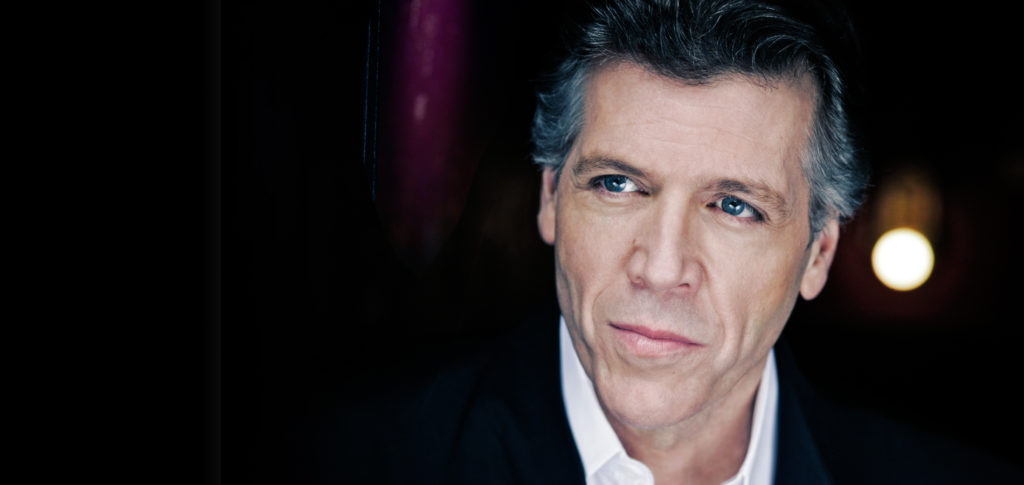‘Hampson brings power and eloquence to German lied and American song at Ravinia’

“No living opera singer has done more for the cause of American song than Thomas Hampson.
The Elkhart-born baritone has recorded extensive homegrown repertoire from Stephen Foster to Charles Ives and Leonard Bernstein. He has collaborated with the Library of Congress in his “Song of America” project, later partnering with WFMT in a radio series of the same name exploring American culture through our nation’s rich song heritage.
Perhaps most importantly he has continued to perform new music. Tuesday night at Ravinia, Hampson presented the Midwest premiere of Civil Words, a new song cycle written for him by Jennifer Higdon. Looking trim, tan and relaxed, Hampson–who turned 60 last month–showed why he remains one of our finest interpreters of German lied and American song . . . with characteristic dramatic strength, emotional depth and unassailable artistry. Pianist Kevin Murphy was an equally sensitive and committed keyboard partner throughout.
Hampson remains one of our finest German lied interpreters, as shown in his first half of Schubert and Mahler. Six Schubert settings from Schwanengesang centered on varied, mostly darker aspects of love, and Hampson fully encompassed the divergent emotions. He delivered a vehement rendition of “Der Atlas,” brought light romantic caprice to “Das Fischermadchen,” and conveyed the numbed heartbreak of “Ihr Bild.” The singer brought a wide expressive range and searing power to “Am Meer,” and bitter rage to “Der Doppelganger.”
The Mahler settings began in a light mode with the vernal charm of “Fruhlingsmorgen,” “Ging heut Morgens ubers Feld”—familiar as a theme of the composer’s Symphony No. 1—and the hearty bravado and humor of “Aus! Aus!” The mood turned darker with the war milieu of the final settings, Hampson spitting out the subversive irony of the line “Er ist ein Kaiser!” in “Der schildwache Nichtlied.”
The anti-militarist Mahler settings made an apt prelude for the concert’s second half, which focused on texts of or inspired by the Civil War era.
Higdon’s Civil Words was commissioned for Hampson by Carnegie Hall and the singer gave the world premiere in New York last February.
Higdon’s five-song cycle, set to American texts, is more allusive and subdued than starkly dramatic. In “Enlisted Today” a Southern mother worries about her son going off to fight in the Confederate army, and here Higdon’s long, rhapsodic lines wrap gracefully around the text. In the tense “All Quiet” (poem by Thaddeus Oliver) a sentry guarding the Potomac reminisces about his family before he is shot by a sniper.
“Lincoln’s Final” is aptly ceremonial, setting part of the 16th president’s reconciliatory final public address, followed by the solemn “Death of Lincoln” on a poem by William Cullen Bryant. The cycle concludes with “Driving Home” (text by Kate Putnam Osgood) wherein a father muses on the end of the war, as his son appears on the horizon returning home . . . No complaints about the performance with Hampson and Murphy giving full and wide expressive advocacy.
More striking were the American songs that prefaced Higdon’s cycle. Hampson’s lively vocalism conveyed the martial rhythms of Henry Thacker Burleigh’s “Ethiopia Saluting the Colors,” as surely as the bluesy-spiritual expression of Langston Hughes’ race-memory text in Margaret Bonds’ “The Negro Speaks of Rivers.” Most effective was Hampson’s poignant rendering of Michael Daugherty’s spare “Letter to Mrs. Bixby” (from the composer’s excellent song-cycle written for Hampson, Letters from Lincoln), a galaxy removed from Daugherty’s jokey pop-culture-inspired works.
The singer emerged to prolonged ovations and sent the audience home with more American song. First was a refined and expressive “Sure on this Shining Night” by Samuel Barber (text by James Agee). Hampson closed the evening with a relaxed and eloquent “Shenandoah,” an apt coda to the evening.”
Lawrence A. Johnson – Chicago Classical Review